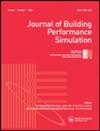基于增强衰落记忆卡尔曼滤波的未知输入室内热动力学联合状态估计
IF 2.3
4区 工程技术
Q2 CONSTRUCTION & BUILDING TECHNOLOGY
引用次数: 1
摘要
智能、高效地利用供暖、通风和空调系统有助于降低建筑能耗,从而有望减少温室气体的排放。能源剖面需要对具有不确定性的建筑环境进行建模和估计。本文提出了一种基于遗忘因子的衰落记忆卡尔曼滤波器(FMKF)在未知输入下估计多壁室内热动力学的策略。本文还提出了一种基于FMKF的联合状态估计方案,该方案考虑了未知加热能量输入的增加以及室内环境热力学模型的热参数。在测量节点分布的背景下,研究了未知输入对状态估计过程的贡献。该方法已在多个实际热场景中实现,结果优于传统的基于卡尔曼滤波的估计方案。本文章由计算机程序翻译,如有差异,请以英文原文为准。
Joint state estimation of indoor thermal dynamics with unknown inputs using augmented fading memory Kalman filter
An intelligent and efficient utilization of a heating, ventilation, and air conditioning system can be instrumental to reduce the building energy consumption, which in turn, is expected to reduce the green-house gases. The energy profiling requires modelling and estimation of the building environment with uncertainties. This paper proposes a strategy to estimate indoor thermal dynamics at multiple walls using a forgetting factor-based fading memory Kalman filter (FMKF) in presence of unknown inputs. This work also proposes a joint state estimation scheme based on FMKF which considers augmentation of the unknown heating energy inputs along with the thermal parameters of the thermodynamic model developed for indoor environment. The contribution of unknown inputs in the process of state estimation have been studied in the context of measuring node distribution. The proposed scheme has been implemented for multiple real-life thermal scenarios and results outperformed the conventional Kalman filter-based estimation scheme.
求助全文
通过发布文献求助,成功后即可免费获取论文全文。
去求助
来源期刊

Journal of Building Performance Simulation
CONSTRUCTION & BUILDING TECHNOLOGY-
CiteScore
5.50
自引率
12.00%
发文量
55
审稿时长
12 months
期刊介绍:
The Journal of Building Performance Simulation (JBPS) aims to make a substantial and lasting contribution to the international building community by supporting our authors and the high-quality, original research they submit. The journal also offers a forum for original review papers and researched case studies
We welcome building performance simulation contributions that explore the following topics related to buildings and communities:
-Theoretical aspects related to modelling and simulating the physical processes (thermal, air flow, moisture, lighting, acoustics).
-Theoretical aspects related to modelling and simulating conventional and innovative energy conversion, storage, distribution, and control systems.
-Theoretical aspects related to occupants, weather data, and other boundary conditions.
-Methods and algorithms for optimizing the performance of buildings and communities and the systems which service them, including interaction with the electrical grid.
-Uncertainty, sensitivity analysis, and calibration.
-Methods and algorithms for validating models and for verifying solution methods and tools.
-Development and validation of controls-oriented models that are appropriate for model predictive control and/or automated fault detection and diagnostics.
-Techniques for educating and training tool users.
-Software development techniques and interoperability issues with direct applicability to building performance simulation.
-Case studies involving the application of building performance simulation for any stage of the design, construction, commissioning, operation, or management of buildings and the systems which service them are welcomed if they include validation or aspects that make a novel contribution to the knowledge base.
 求助内容:
求助内容: 应助结果提醒方式:
应助结果提醒方式:


